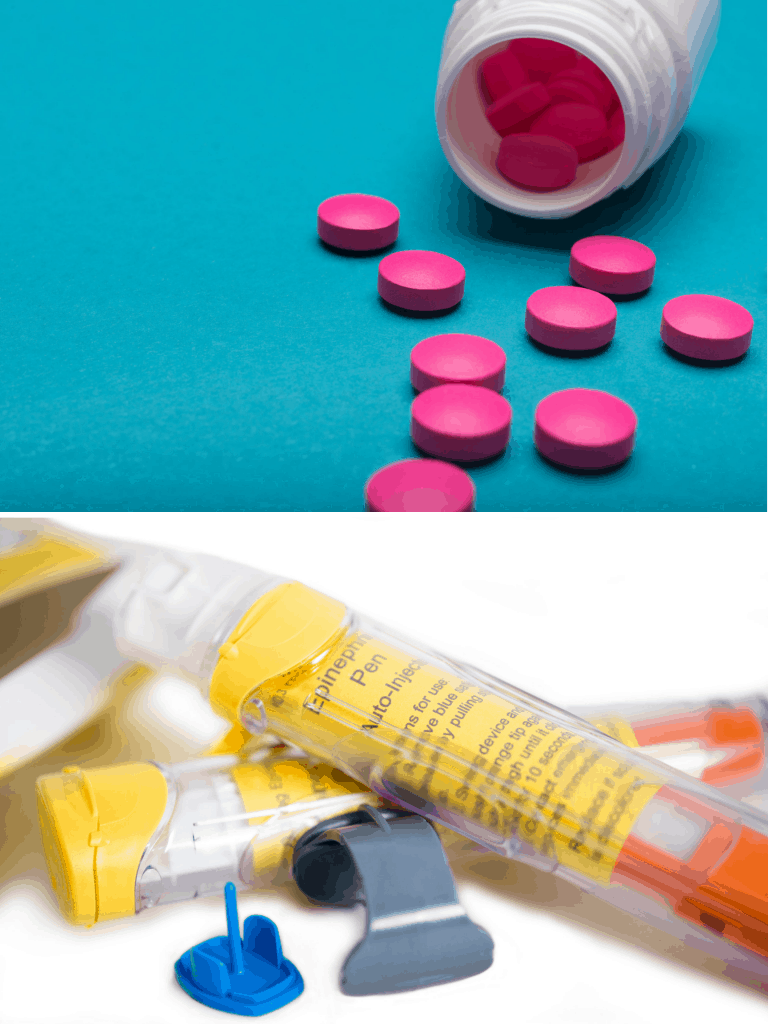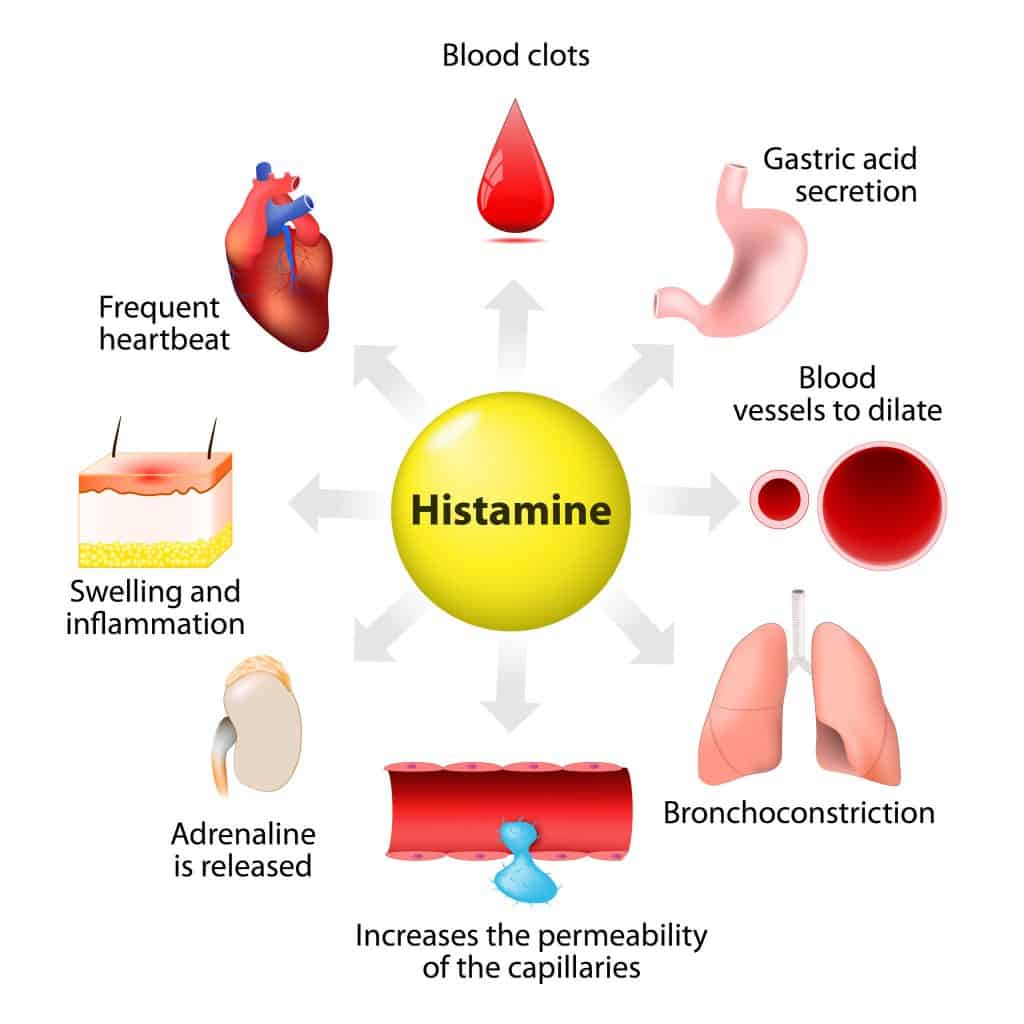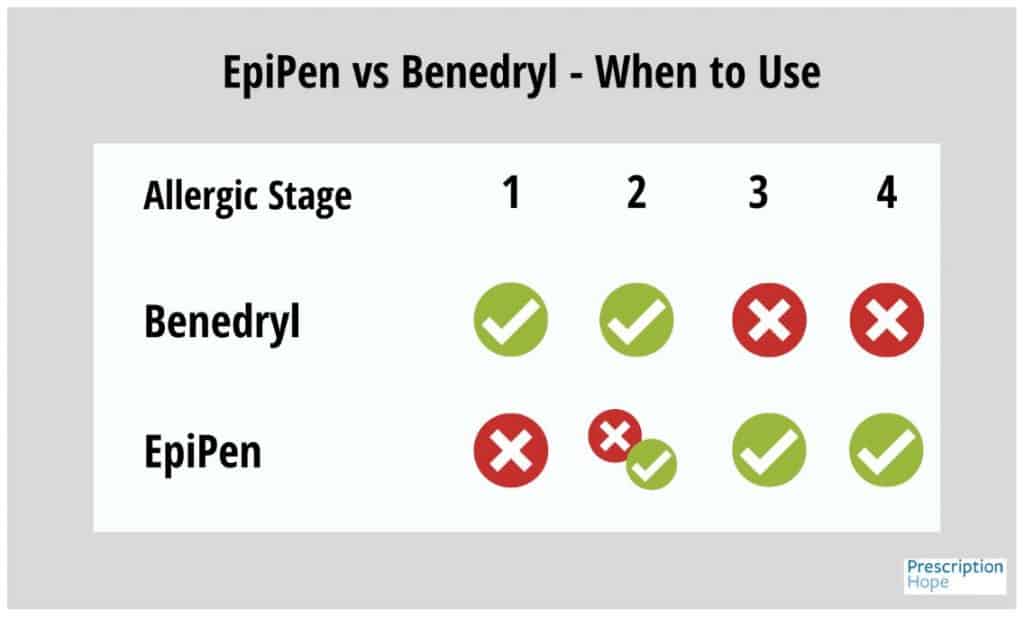When To Use EpiPen vs Benadryl, at What Point and Why, a Guide
Posted by Prescription Hope - See Editorial Guidelines (Last Updated On: Thu Feb 02 2023)
A question that is often asked is when to use an EpiPen vs Benadryl. So, in this article, we’re going to cover the use of EpiPen vs Benadryl and when to use each. We’ll start with the quick answer, and then we’ll get into more details.
When to Use EpiPen vs Benadryl? Benadryl is used in allergic stages 1 and 2, which exhibits mild symptoms and those that don’t need treatment within 30 minutes. EpiPen is used for severe allergic reactions (anaphylaxis), such as in allergic stages 3 or 4. EpiPen is for instant life-saving treatment followed by emergency care.

The Severity of Allergies Determines When to Use EpiPen vs Benadryl

Allergic reactions are one of the most ambiguous medical conditions you can go through.
Starting with mild symptoms, allergic reactions can become worse very quickly. Therefore, it is crucial to take the right medications. However, the right medications depend on the severity of the allergy you have.
The severity of allergies will vary with each individual, the allergen involved, and the time of exposure to an allergen. But every time you get an allergic reaction, the symptoms could be more severe than the last time.
So, either EpiPen or Benadryl should be used depending on the severity of the allergy. And to understand the different severity of allergies, below are the four common stages of an allergic reaction.
Understanding this will make it easier for you to understand when exactly to use an EpiPen vs Benadryl.
Stage 1 – EpiPen vs Benadryl
The first stage of an allergy can commonly start with vomiting, cramps, nausea, and even diarrhea.
Hives and itching are also common symptoms of stage one allergy, which has the potential to lead to a case of eczema or dermatitis.
In stage one, you could also have a high tendency to sneeze and cough, followed by wheezing.
Stage 2 – EpiPen vs Benadryl
Stage two allergies may bring about more extreme respiratory symptoms like laryngeal edema. This is as a result of the allergy in stage one spreading gradually.
If you’re unable to breathe and often need help, it may mean that the allergy is spreading and reaching stage two.
In this stage, symptoms like uterine cramps and vomiting can be experienced. Along with that, you can also get symptoms like swelling around the mouth and the tongue.
Stage 3 – EpiPen vs Benadryl
When your allergies reach stage three, it means your allergic reaction can cause you to suffer from a complete respiratory failure. This means you can even end up unconscious.
In stage three, if or when the allergy continues to spread, more and more organs in your system could shut down.
A stage three allergic reaction can also result in a psychological reaction where you can start to feel completely helpless and be confused or unaware of what is happening around you.
Stage 4 – EpiPen vs Benadryl

Stage four is the most severe and final stage of allergy, causing serious harm or even death.
This stage is what results in Anaphylactic shock, often caused by a food allergy.
When you go through a stage four allergic reaction, your entire gastrointestinal and respiratory systems can fail.
During this course of failure, if your cardiovascular system also shuts down, it could lead to a case of hypertension that can cause fatal reactions.
Now that we know the severity of each stage of allergic reactions, it’s easier to convey when to use an EpiPen and Benadryl effectively.

EpiPen vs Benadryl – When to Use
To understand when to use these two medications it’s important to understand how they work.
How Benadryl Works and When to Use It
When your body is exposed to an allergen, it naturally produces a substance called histamines to protect you.
It’s because of this release that you develop reactions such as a runny nose, watery eyes, swelling, and so on. These reactions can also lead to itchiness and rashes.
The active ingredient in Benadryl is an antihistamine.
Antihistamines keep histamines from binding to receptors, which is what triggers one’s response to allergens. This then helps alleviate certain allergy symptoms.
Sometimes Antihistamines are prescribed in combination with decongestants for maximum effect.
Mild allergic symptoms
Antihistamines are aimed at combating mild allergic symptoms such as:
- Sneezing
- Hives
- Coughing
- Common cold
- Rash
- Itchy skin
- Watery eyes
- Itchy eyes/nose/throat
- Nausea
- Vomiting
- Dizziness/Motion sickness
Apart from this, since Benadryl contains diphenhydramine and cetirizine, it can also help with hay fever, stings, and conjunctivitis.
Because of how Benadryl works, it is not meant to treat severe allergic reactions, such as stages three and four. Most of the symptoms that Benadryl treats are restricted only to stage one and two of allergic reactions.
Even though Benadryl can ease allergic reactions in stages one and two, it is important to note that it can cause drowsiness.
How an EpiPen Works and When to Use It
When your allergic symptoms reach the 3rd or 4th stage, you can experience severe symptoms, such as difficulty breathing and a reduced heart rate.
This is often referred to as “anaphylaxis.” Anaphylaxis is often caused by food allergies, such as nuts and fish.
What happens when you’re going through anaphylaxis is that the inflammatory mediators such as histamines cause contractions in the smooth muscles (the lungs), fluid leakage, and blood vessel dilation and reduces the heartbeat.
These symptoms can become severe in a matter of seconds, making it almost impossible to breathe due to swelling of the airway.
Effects of EpiPen
An EpiPen plays a vital role in the fight-or-flight response, where it starts relaxing the muscles of the airways and lungs while increasing the blood pressure and heart rate by constricting blood vessels.
An EpiPen effectively reverses the effects of anaphylaxis. So in summary, an EpiPen is the only medication that can immediately control any severe allergic symptoms that you’ll experience in allergic stages 3 or 4.
So, if you discover that you have a severe allergy to something, then talk to your doctor about getting prescribed an EpiPen.
Usually, an EpiPen works fast, and you should get instant relief that will help you breathe better. If you don’t experience any relief, a second dose may be required.
After the first or second dose (whichever works), you should then seek immediate medical attention, even if you feel better.
This is because the allergen can trigger again, even if the medication is in your system.

Understanding the Importance of When to Use an EpiPen vs Benadryl
If you’re skeptical about when to use an EpiPen and Benadryl, then it’s important to understand that you can cope with allergies that require Benadryl for some time until you get to a doctor.
But when it comes to escalating or severe allergies that require an EpiPen, it can be a matter of life and death.
If you don’t have an EpiPen on hand and want to use Benadryl, it’s important to know that Benadryl can only treat a few symptoms of severe allergic reactions. Benadryl takes effect around 30 minutes after each dose, which is far too long for treating a severe allergic reaction.
This is why many health professionals emphasize not to be hesitant when it comes to using an EpiPen as soon as you start feeling the symptoms of 3rd or 4th stage allergic reactions.
You should keep in mind that Benadryl cannot
save your life, but an EpiPen can!
Patients are often confused about the symptoms, in such situations, it’s also recommended to use the EpiPen route.
If you know through consultation that it’s a mild allergic reaction, like those in stage 1 or 2, then an EpiPen may not be required. Overall, the risk of taking an EpiPen when you don’t need it outweighs the risk of fatal reactions or death.
There are no such cases of any death using an EpiPen. The only drawback of using an EpiPen when you don’t need it is its side effects, which may include rapid heartbeat, nervousness, shakiness, and anxiety.
Seek Professional Advice
This article is not intended to be complete medical guidance. We would, of course, always recommend consulting your doctor before taking any drugs you feel may not be suitable or effective.

To Close
Be cautious and mindful of what your symptoms are or could be. Watch for early signs of worsening symptoms. If you’re prone to allergies, your doctor may recommend carrying an EpiPen, so speak to your doctor if you’re concerned or need further advice.
If you’re struggling to afford your EpiPen prescription or other prescribed drug, then Prescription Hope may be able to help. Enroll with us and see if you qualify to pay only $60.00 a month through Prescription Hope’s medication access service for each of your medications.
ENROLL



